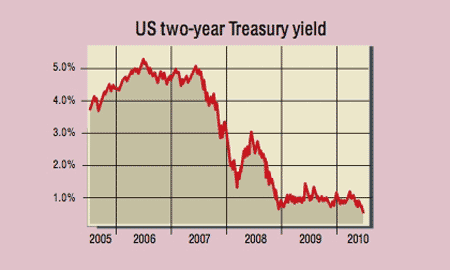
The markets suffered another panic attack early this week. The S&P 500 and FTSE 100 fell to seven- and nine-month lows respectively, both losing over 3% on Tuesday. The latter has fallen by 15% since mid-April. Chinese stocks hit a 14-month low. The two-year US Treasury yield slid to a record low of 0.59% and the ten-year yield fell under 3% for the first time in 14 months. The euro reached a record low against the Swiss franc and a 19-month low against sterling. The eurozone’s three-month interbank lending rate increased to a nine-month high.
What the commentators said
These days “investors must feel… that they have been blindfolded and placed in a room full of hidden trapdoors”, as Elliot Wilson put it in the Daily Mail. “Trouble seems to lurk everywhere.” One problem was the drop in US consumer confidence for May, adding to mounting evidence of an impending double dip in the US economy. That could even lead to outright Japan-style deflation.
China has also produced a growth scare. The US Conference Board produces a leading indicator for the Chinese economy. It corrected the recently reported figure for April from 1.7% to 0.3%. “Investors have to cope with a lot of Chinese data that they fear may be massaged in an optimistic direction,” said Buttonwood on Economist.com.
So they take any signs of weakness seriously. Reinforcing general growth jitters is the fact that governments are gradually removing stimuli and cutting back – the market has been weak since the eurozone shifted to austerity measures. Investors fear that economies can’t stand on their own two feet.
A key reason the recovery looks so fragile is that the financial system “has not been fixed”, says Tracy Corrigan in The Daily Telegraph. So lending is unlikely to jump any time soon. Spanish banks in particular appear to be suffering a liquidity squeeze. The wider problem is that austerity in Europe risks triggering a second banking crisis if it sends the economy downhill again or brings about a government default. We still don’t know which banks are capable of withstanding further shocks. Publishing stress test results won’t allay fears, said Corrigan. If the news is good, it may not be believed because “continental banks have avoided coming clean for years”. No wonder investors are so jittery.
It’s like two years ago, concluded RBS’s Andrew Roberts: “complacency giving way to the abundant risks out there”.